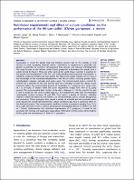| dc.identifier.citation | Langi, S., Maulu, S., Hasimuna, O. J., Kaleinasho Kapula, V., & Tjipute, M. (2024). Nutritional requirements and effect of culture conditions on the performance of the African catfish (Clarias gariepinus): a review. Cogent Food & Agriculture, 10(1), 2302642. https://doi.org/10.1080/23311932.2024.2302642 | en_US |
| dc.description.abstract | Aquaculture is crucial for global food and nutrition security due to the inability of wild harvests to meet increasing demand. Africa’s contribution to aquaculture is generally low, despite its potential for economic development, food security, and reduced unemployment. The study focuses on the African catfish (Clarias gariepinus) a freshwater fish species that is widely farmed for food in Africa and other parts of the world. Proper nutrition is essential for the growth and development of the fish, and understanding their nutritional requirements is critical for producing healthy and high-quality fish. This review article provides an overview of the knowledge on the nutritional requirement of the African catfish, including protein, lipids, carbohydrates, vitamins, minerals, and amino acids. The recommended protein content for juvenile fish is between 40 and 50% and for adult fish is between 30 and 40%. Based on the reviewed studies, the recommended amount of methionine in C. gariepinus diets ranges from 18.7 to 29.7 g/kg of protein while the lysine requirement ranges from 44.9 to 62.2 g/kg protein). The recommended lipid content in the diet is between 5–15% for juvenile fish and 5–10% for adult fish. The African catfish requires a low-carbohydrate diet, with recommended carbohydrate content between 26 and 32%. They require a variety of vitamins, including vitamin A, vitamin D, vitamin E, and vitamin C, as well as minerals, such as calcium, phosphorus, and potassium. Clarias gariepinus also require a variety of essential and non-essential amino acids. Besides the nutritional requirements, culture conditions also have a significant effect on the feed performance. The recommended conditions include temperature ranging from 28 to 32 °C, Light intensity of 150 Lx, 12D:12L photoperiod, and stocking density in earthen of 7 fish m−3. Overall, understanding the nutritional requirements of C. gariepinus is crucial for the successful fish farming and sustainable aquaculture. Information in this review will be built to further guide the development of feeds for C. gariepinus. | en_US |

